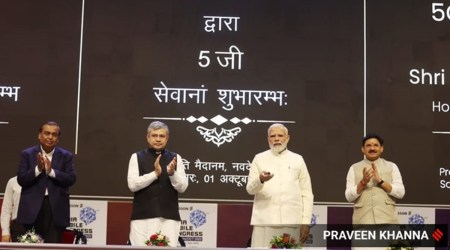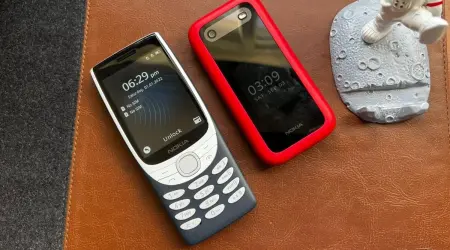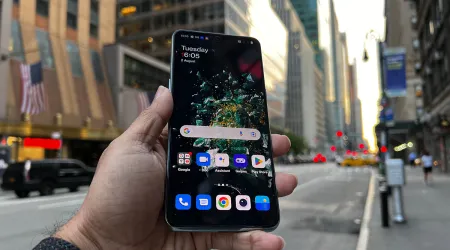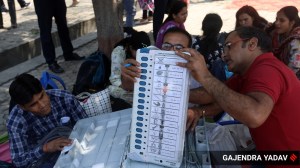- India
- International
What the new antitrust lawsuit means for Apple and its iPhone users
The DOJ alleges that Apple has maintained its monopoly over what it calls "performance smartphones," for which it says Apple has 70 per cent market share, by limiting the ability for third-party developers to compete.
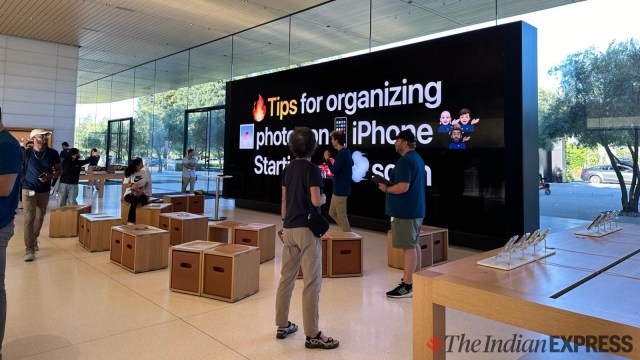 It seems pretty evident, reading through the 88-page complaint, that the DOJ really wanted to make a different argument, and it has nothing to do with the App Store. (Image credit: Nandagopal Rajan/The Indian Express)
It seems pretty evident, reading through the 88-page complaint, that the DOJ really wanted to make a different argument, and it has nothing to do with the App Store. (Image credit: Nandagopal Rajan/The Indian Express)Twenty-six years ago, Microsoft was sued by the Department of Justice (DoJ) and a coalition of 20 state attorneys general for violating federal antitrust laws. They accused the tech giant of taking advantage of its monopolistic position through the Windows operating system and using its market power to dominate the browser market with its browser, Internet Explorer, thus crushing its competitors, notably Netscape.
The Microsoft trial, which began in October 1998, spanned 76 days of testimony over more than eight months, making it a landmark antitrust case in tech history. This time, Apple is on the radar of the US federal government. And because Apple is so influential, the DoJ’s antitrust complaint against the Cupertino giant filed last week could have a much bigger impact at a time when regulators are already cracking down on tech giants.
Apple’s top lawyers have to prove why this time is different and why the charges levied against the world’s most valuable tech company shouldn’t be compared to the fight the DoJ had with Microsoft years ago. The lawsuit aims directly at Apple’s popular products and services, which have fueled its growth in the past few years and helped the company become a nearly $2.75 trillion tech behemoth.
The iPhone Antitrust Lawsuit
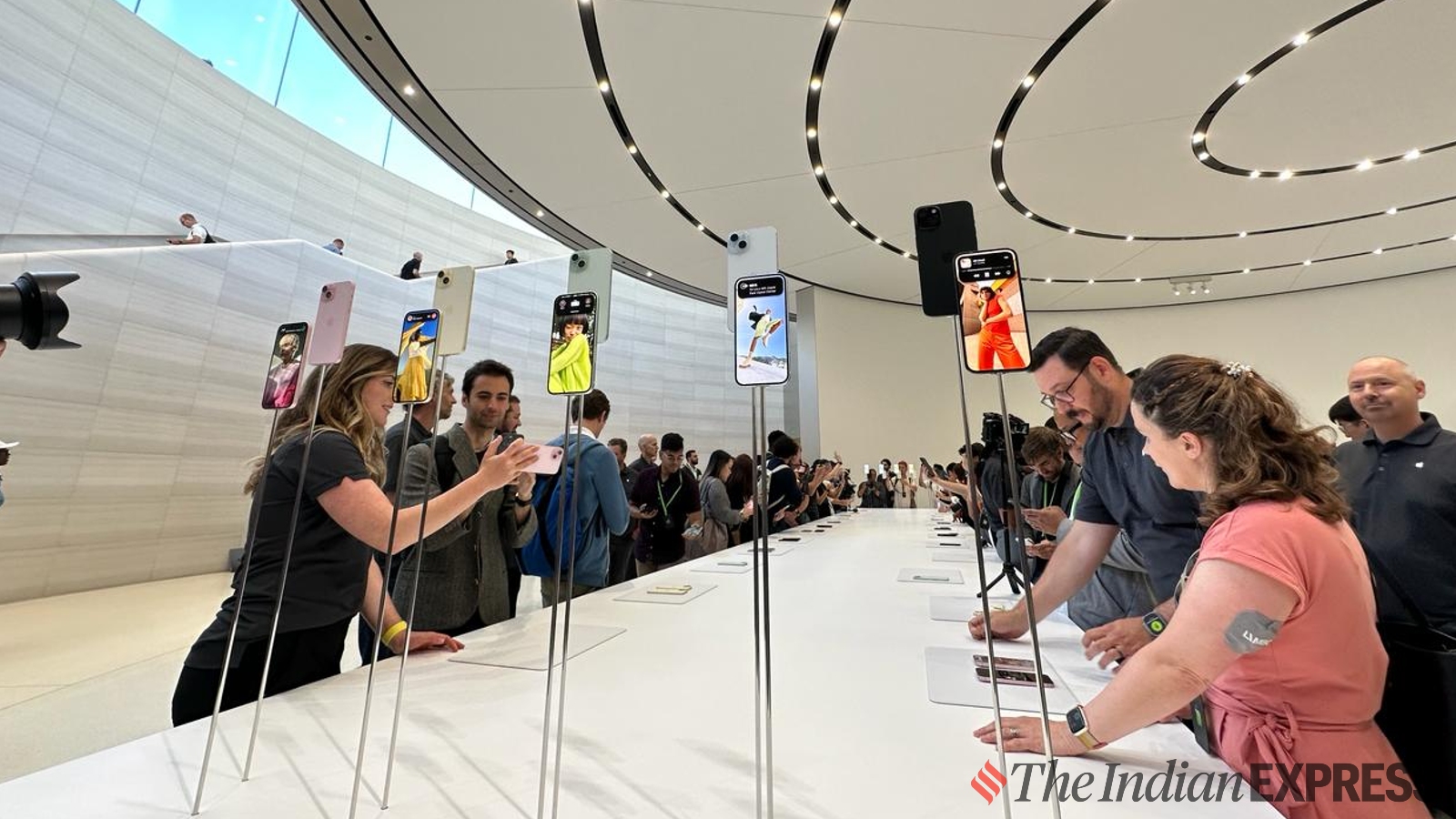 The Justice Department has the right to make changes to Apple’s business— including a breakup. (Image credit: Nandagopal Rajan/The Indian Express)
The Justice Department has the right to make changes to Apple’s business— including a breakup. (Image credit: Nandagopal Rajan/The Indian Express)
The lawsuit alleges that the tech giant violated Section 2 of the Sherman Antitrust Act, with 16 state and district attorneys general joining the DoJ in accusing the tech giant of a stronghold on the smartphone market and a separate market for “performance smartphones.”
By “performance smartphones,” the Justice Department meant phones that are made from premium materials such as metal and glass; offer faster and better processors, or bigger storage sizes; and have cutting-edge communications tech inside such as tap-to-pay chips. These phones are much superior and hence are different from entry-level smartphones.

This is understandable. The iPhone is a premium device and can’t be compared to basic phones, even if they have the same set of features. Despite being a high-end product, Apple sells iPhones in millions each year. In fact, since its debut in 2007, the iPhone remains one of the most popular smartphones in the world, with over 2.3 billion units sold and nearly 1.5 billion active users. Just last year, Apple surpassed Samsung as the world’s smartphone leader, holding 20 per cent of the global market share.
One of the main points raised by the DoJ in the lawsuit is precisely why Apple is in hot water, and it’s the iPhone, which is the company’s biggest moneymaker, making up approximately 58.3 per cent of Apple’s total revenue in the first quarter of the company’s fiscal year 2024. That number dwarfs the sales of every other Apple product.
There’s one big reason why people keep buying iPhones: the ecosystem. Though the hardware is important, it’s the ecosystem of software and services that allows users to keep investing in Apple products. The launch of the App Store in 2008 was a huge factor in creating an app ecosystem around the iPhone, revolutionising the smartphone market. Apple continues to expand the ecosystem, thereby increasing the interactivity between its devices. For example, FaceTime calls work only on the iPhone, iPad, and Mac. The Apple Watch works flawlessly with the iPhone, allowing users to fully utilise the features the wearable has to offer. And Apple makes sure to highlight the stickiness of the ecosystem and the privacy and security features its products offer as the reasons why people prefer to buy iPhones.
But the Department of Justice accuses Apple of thwarting innovation and locking customers into its walled garden—factors that Apple touts as merits of choosing an iPhone over competitors’ devices. The US alleges that in the name of tight control of the user experience on iPhones and other products, Apple can offer special access to core features but restricts the same for rivals. For example, Apple doesn’t allow third-party players to access the iPhone’s payment chip and offers rival services to Apple Pay, which is exclusive to the iPhone. Similarly, the DoJ also points out that Apple has made it difficult for the iPhone to work with smartwatches from rival companies, whereas its Apple Watch is not only easy to pair with the iPhone but also receives deep integration with the iPhone and the Apple ecosystem at large. It also accuses Apple of treating messages sent from rival Android smartphones differently, distinguishing them with green bubbles and limiting videos and other features.
US Attorney General Merrick Garland specifically commented on Apple’s messaging strategy. “iPhone users perceive rival smartphones to be of lower quality,” he said. Apple has said it plans to support RCS, a more modern messaging protocol, for improved cross-platform communication later this year. But don’t expect those bubbles to change colour anytime soon. The DOJ says iMessage is the huge factor for people to lock into the Apple ecosystem – at least in the US vs. other markets where Meta’s WhatsApp is dominant.
The suit also states that Apple has suppressed mobile cloud streaming services on its platform, which would have allowed users to play games with high-fidelity graphics without needing high-end hardware like the latest iPhone 15 because these games are hosted on a remote server. If users have access to a fast internet connection and a smartphone (it could be a $200 Android smartphone or a used iPhone), then no one would buy Apple’s newest iPhone. This goes against Apple’s business model, alleges the DoJ.
The suit criticises Apple for insisting that cloud-streaming games be submitted as stand-alone apps for its approval rather than having them exist in a singular hub of games and use its proprietary payment system. Back in 2020, Microsoft came out and said that Apple was not letting cloud-gaming apps such as Project xCloud on the iPhone due to arbitrary rules, using them as an excuse to keep cloud-based gaming services off Apple hardware. Perhaps in a change of heart, Apple did announce it would open the App Store for game-streaming apps and services in January, finally allowing cloud streaming services to submit a single app “with the capability to stream all of the games offered in their catalogue.”
Despite this, the DoJ claims that Apple “wielded its power over app distribution to effectively prevent” developers from offering cloud streaming services on the iPhone, adding that “even today, none are currently available on the iPhone.”
The lawsuit also discusses how Apple limits the scope of “super apps,” an application that offers multiple services from payments to the ability to book flights and hotels rolled into one single app. Something like WeChat, a hugely popular app in China with billions of users. The app is device-agnostic, meaning no matter whether you have an Android phone or iPhone, WeChat will provide the same experience across any platform. The DOJ argues that such “super apps” never got popular in the US because Apple saw them as a threat to its App Store and the iPhone. If users have access to multiple apps (or “mini programs” as offered in WeChat) within a single app, they don’t need to download separate apps onto their devices in the first place. It’s both convenient for users and developers, as the latter no longer need to push separate app updates for Android and iOS since these programs run within the same app and not on phones.
“Apple recognises that super apps with mini-programs would threaten its monopoly,” the lawsuit states. “As one Apple manager put it, allowing super apps to become ‘the main gateway where people play games, book a car, make payments, etc.’ would ‘let the barbarians in at the gate.”
While some may cite cultural differences and a different regulatory environment as the reason why super-apps are more popular in China and not in the US, the truth is the business model around the super-app provides the platform holder access to a wide array of user data, all gathered within the app’s walled gardens. However, the DOJ continues to argue that the iPhone maker sees super apps as “fundamentally disruptive” to “existing app distribution and development paradigms” and Apple’s monopoly power.
“While Apple’s anticompetitive conduct arguably has benefited its shareholders – to over $77 billion in stock buybacks in its 2023 fiscal year alone – it comes at a great cost to consumers. Some of those costs are immediate and obvious, and they directly affect Apple’s customers,” the DOJ wrote.
iPhone could look different if charges are proven
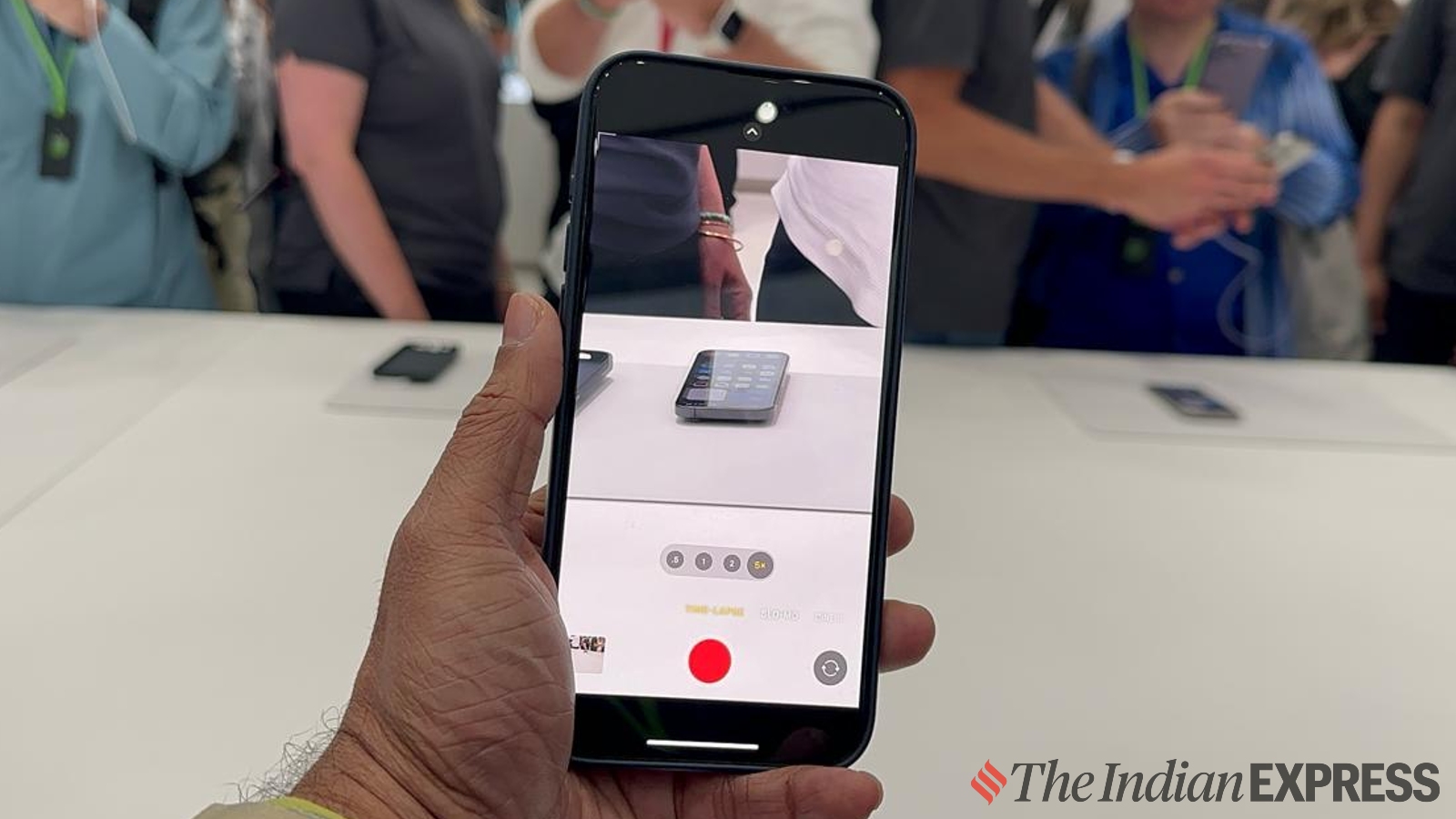 The government points out that Apple uses “privacy and security” as a way to make more money. (Image credit: Nandagopal Rajan/The Indian Express)
The government points out that Apple uses “privacy and security” as a way to make more money. (Image credit: Nandagopal Rajan/The Indian Express)
Apple has called the lawsuit “wrong on the facts and the law” and warned that the case would set a “dangerous precedent”. Experts say a resolution is not expected soon, and Apple will fight the case and defend its business practices to safeguard the iPhone and the sprawling empire it has created over the years. This case could go on for a long time. However, if the U.S. Department of Justice wins its antitrust lawsuit against the Cupertino tech giant, the implications for Apple’s business could be significant — potentially changing the ways the company sells its devices to customers and charges app developers.
The argument made by the DoJ rests on whether it can prove that Apple engages in current practices, including blocking cloud-streaming apps and preventing the creation of digital wallet alternatives on the iPhone that are anti-competitive, hence proving Apple’s monopolistic intention to stifle competition. According to the Justice Department, Apple’s share of the US smartphone market is roughly around 70 per cent, and its share of the broader smartphone market exceeds 65 per cent.
For Apple, the lawsuit comes at a sensitive time when the market is quickly adopting artificial intelligence and integrating the latest technology into products. However, Apple is seen in a weak spot as it lags behind Microsoft and Google in developing its technology. Investors are already questioning Apple about its next big product after it axed its plans to build an electric car, ending a secretive project that could have opened new revenue streams in the coming decade. Regulator scrutiny could get stricter with Apple’s reported plan to use Google’s generative AI on the iPhone — particularly since Google is already under scrutiny for paying Apple billions to be its default search provider.
In recent years, Apple, especially, has faced a growing legal backlash over its iOS ecosystem and business practices. App developers such as Spotify and Epic have complained for years, accusing Apple’s App Store of being a closed marketplace — the only place that lets iPhone users download apps. Apple requires up to 30 per cent cut to be offered on its platform from app subscriptions or in-app purchases from third-party developers. Developers have said this cut makes it difficult to keep their businesses running. Apple has long defended its practices.
Justice Department Sues Apple for Monopolizing Smartphone Markets
🔗: https://t.co/sQuqVnTzaX pic.twitter.com/9ipWckqfvc
— U.S. Department of Justice (@TheJusticeDept) March 21, 2024
https://platform.twitter.com/widgets.js
But Apple’s legal troubles have only increased in recent years, largely focused on its control over the iPhone App Store. In 2020, Epic Games, the maker of the popular video game Fortnite, sued Apple, arguing that requiring users to get apps through the App Store and pay for digital content inside an app using Apple’s system was a monopolistic practice. Apple won in a civil suit against Epic Games in 2021, although it had to make some changes to its policies under California law.
While it remains to be seen how the U.S. government’s antitrust lawsuit against Apple would impact consumers, the argument made by the DoJ mirrors that of European regulators who forced the Cupertino giant to make changes to the App Store in Europe. The EU has labelled Apple as one of the internet “gatekeepers” while recently imposing a fine of €1.84 billion (about $2 billion) in connection with a complaint from Spotify about its restrictive app store practices. With the new EU Digital Markets Act now enforceable, giving the European Commission more powers to check in on Big Tech, the EU is already forcing Apple to allow third-party app stores in Europe, among other changes, including the option to download an alternative web browser.
There is a sense that Apple is responding to the laws and making requested changes, opening up the walled garden. However, analysts don’t expect any major shift in the business model immediately. Although more choice is always good, this doesn’t mean the iPhone will become more affordable anytime soon, or that the lawsuit will pave the way for cheaper app subscriptions.
One of the things regulators keep bringing up is how Apple’s closed ecosystem locks consumers into one company’s products or services. In its defence, Apple can also argue that its competitors, including Samsung, one of the world’s biggest smartphone makers, are trying to replicate its strategy by attempting to build an ecosystem similar to Cupertino’s while being part of the larger and open Android ecosystem.
More Tech
Apr 28: Latest News
- 01
- 02
- 03
- 04
- 05















